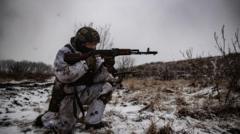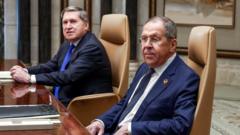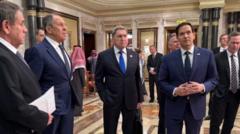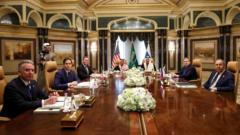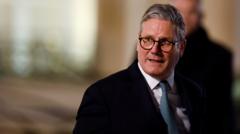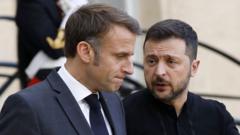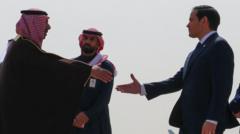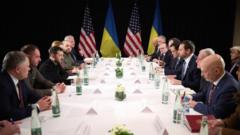In a significant policy shift, US Defence Secretary Pete Hegseth, addressing European leaders at a Brussels summit, emphasized the necessity for European nations to take the lead in funding Ukraine amidst ongoing tensions with Russia. Hegseth deemed the idea of restoring Ukraine to its pre-2014 borders as "unrealistic" and questioned the feasibility of Ukraine's NATO membership, pointing towards an evolving landscape of international relations and defense responsibilities.
Hegseth Advocates European Self-Reliance in Defence and Shifts NATO Dynamics
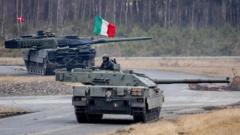
Hegseth Advocates European Self-Reliance in Defence and Shifts NATO Dynamics
New US Defence Secretary calls for increased European contributions to Ukraine's defense efforts, outlining a new strategy that departs from traditional American approaches.
Hegseth's comments signal a definitive change in Washington’s stance on Ukraine and NATO's role, as he articulated that European countries must significantly increase their defense spending and contributions to Kyiv. He reiterated the US's diminishing tolerance for what he perceives as an uneven partnership, advocating for Europe to shoulder the majority of future aid to Ukraine, both in military and financial dimensions, while cautioning against unrealistic expectations regarding territorial integrity.
During his address, Hegseth outlined that any sustainable peace agreement would necessitate solid security assurances, preferably supported by robust non-NATO troop deployments, effectively redefining America's engagement strategy towards the conflict. His remarks also coincided with indications from former President Trump of a willingness to negotiate with Russia, further complicating the geopolitical landscape.
Hegseth’s statements are likely to cause trepidation in Ukraine, which has actively sought NATO membership and has stood firm against territorial compromises. Meanwhile, Russia could view these developments favorably, as shifts in support dynamics could embolden its position in negotiations. Observers in Europe are apprehensive about the potential decline in US support, given that Kyiv has relied heavily on American military backing in the face of Russian aggression.
Despite the uncertainty looming over future relations and aid structures, Ukrainian President Volodymyr Zelensky remains committed to pursuing negotiations from a position of strength, revealing plans for reciprocal territory exchanges. However, it raises concerns about the implications of such discussions not only for Ukraine but for the broader stability in Europe.
As the conflict in Ukraine persists and the dynamics within NATO are challenged, the actions taken by European countries in response to Hegseth's call for increased investment and support will be instrumental in shaping the future of defense in the region, alongside the broader geopolitical implications of shifting American priorities.
During his address, Hegseth outlined that any sustainable peace agreement would necessitate solid security assurances, preferably supported by robust non-NATO troop deployments, effectively redefining America's engagement strategy towards the conflict. His remarks also coincided with indications from former President Trump of a willingness to negotiate with Russia, further complicating the geopolitical landscape.
Hegseth’s statements are likely to cause trepidation in Ukraine, which has actively sought NATO membership and has stood firm against territorial compromises. Meanwhile, Russia could view these developments favorably, as shifts in support dynamics could embolden its position in negotiations. Observers in Europe are apprehensive about the potential decline in US support, given that Kyiv has relied heavily on American military backing in the face of Russian aggression.
Despite the uncertainty looming over future relations and aid structures, Ukrainian President Volodymyr Zelensky remains committed to pursuing negotiations from a position of strength, revealing plans for reciprocal territory exchanges. However, it raises concerns about the implications of such discussions not only for Ukraine but for the broader stability in Europe.
As the conflict in Ukraine persists and the dynamics within NATO are challenged, the actions taken by European countries in response to Hegseth's call for increased investment and support will be instrumental in shaping the future of defense in the region, alongside the broader geopolitical implications of shifting American priorities.



